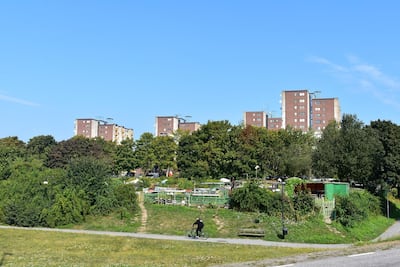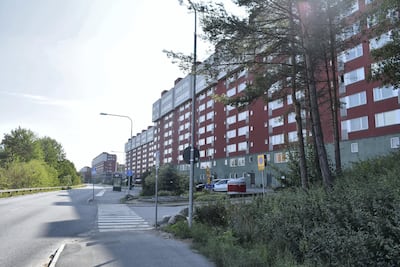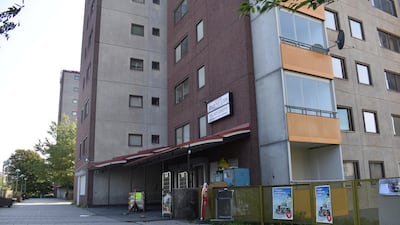“This is Fittja – welcome to one of our no-go-zones”, Officer James Roberts chuckles as he pulls his unmarked police car towards an estate of stark towering apartment blocks near the Swedish capital.
On a warm August morning, local police tell me they are confident they are getting a grip on the spiking crime rates that they say largely emanates from places like Fittja.
Despite the label, Officer Roberts shows little fear about policing what some have called Scandinavia’s crime-stricken ghettos. “They call it ‘no-go-zones,’ we call it ‘go-go zones’”, he says, quoting one of his senior officers.
The former British army soldier spent years policing some of the most-sectarian neighbourhoods of Northern Ireland, but now he calls Sweden home. He heads regular investigations into serious crime in an area of the country with one of the highest crime rates.
But as his jest suggests, he rejects the idea of Sweden having truly ‘no-go-zones’, though he recalls times in recent years when he was forced to pull out of certain situations. “There were times when we didn’t have as many officers as we needed, but we’ve grown recently”, he says.

There are more 9,000 residents in the tower blocks of Fittja, they speak over 100 languages and 57 per cent describe themselves as having a foreign background.
But for all its diversity, the estates are some of the most impoverished corners of Scandinavia – in parts, unemployment soars near to 50 per cent.
Sweden is often regarded as a liberal utopia after decades under a socialist government, but it has been hit by a number of high-profile bouts of violent gang crime that populists around the world have been quick to pounce on, given the country’s generosity to immigrants.
Last month was one of those periods. The city of Gothenburg, 450km to the southeast of Stockholm hit headlines around the world after a stark night of gang violence saw more than 100 cars torched.
“Car burnings, in general, are usually a response to something we’ve done, whether that’s seizing cars of drugs, it usually angers them”, says Officer Roberts, as he pulls his unmarked police car into the shadow of a monstrous tower block.
Sweden’s crime bump is, he says, "is more a question of equipment and legislation, than it is a political issue”.
___________
Read more
WATCH: Sightline with Tim Marshall on Sweden's elections
Denmark burqa ban: Muslims defiant as ban on full-face veil takes effect
Europe's populists take their fight to Sweden’s refugee utopia
__________
One thing does concern him – the sorts of weapons the police are seizing. He points to a house raid where some of his men found a Swedish military machine gun hidden in a washing machine. "We are finding weapons that belong in a war zone", images on the police records show a stash of AK47's found in a parking lot underneath one of the dominating tower blocks. "The real worry is they get into the hands of someone who wants to do some real damage", he adds. The real damage he refers to is terrorism.
Nor is it just guns, “sawn off shotguns, grenades too”, says Officer Roberts. “These are weapons you should be finding on a battlefield - the grenades, smuggled in from the former Yugoslavia, are exclusively the M75 model”, he says.
Sweden is awash with them and gangsters are unafraid to use them. SVT, the state broadcaster, reported in 2015 that an M75 hand grenade on the streets of Sweden cost just one or two euro, “less than an ice-cream cone”.
The number of incidents involving their use tripled in the eight years between 2008 and 2016, with the city of Malmo worst hit. In one month in 2015, it saw one grenade attack a day.
Yet shocking as their usage is, Officer Roberts is even more concerned that the availability means they could fall into the hands of people more dangerous than drug gangs.
Gang attacks are often targeted, he notes, and those involved are after a specific person. Terror attacks are a lot more indiscriminate.
“A machine gun or grenade in the hands of a gangster is one thing, but in the hands of someone who wants to commit terrorism - that’s a real issue”, he says. But, Officer Roberts points out, “Remember these gangsters dislike terrorists as much as anyone else.”
In 2015, at the height of Europe’s migration crisis, Sweden took in 163,000 asylum seekers, the most per capita of any country in Europe. Three years on, the populist-anti-immigration Swedish Democrats are swelling in the polls and are vowing to cut immigration to an absolute minimum and deport any foreign-born person convicted of a crime.
With crime and immigration dominating the public debate ahead of a general election on September 9th, it seems many people agree there are issues.
Many point to a recently unearthed statistic that more than half of Sweden’s convicted rapists were born abroad. In the eyes of the Swedish Democrats, and a growing number of Swedes, there is a clear link.
It was a link that was made even by US President Donald Trump in early 2017 when he told an election rally “you look at what’s happening last night in Sweden. Sweden Who would believe this? Sweden They took in large numbers. They’re having problems they never thought possible”.
Yet there was one major problem with Trump’s comments, he appeared to be referring to an immigration-related incident the day before that never took place.
Anders Sannerstedt, a political scientist at Lund University notes that, “traditionally law and order are not that high of the election agenda, but gang shootings are given high media attention and so other parties try to outdo each other – that’s where the Swedish Democrat’s strength lies”.
Officer Roberts disagrees that there is a link between those who arrived in 2015 and the recent bump in crime. “The new immigration from Syria and Iraq, we don’t usually see them, they want to make a better life. It is those who have fallen into the poverty trap, that’s who we see repeatedly”.
Mr Sannerstedt notes that the country’s populists take a less nuanced view of the causes of Sweden’s crime. “If you ask the Swedish Democrats they downplay the importance of Socio-economic factors and highlight the migration factors instead.”

Wandering through an arcade at the foot of one of the Fittja tower blocks, Officer Robert’s stops to greet a young man in a tracksuit. The man brushes him off, “Do I know you?”, he asks.
“I’ve dealt with him a lot”, Officer Roberts says. Walking on he adds the man was recently on trial for a gang rape, thought the case eventually fell apart and all five defendants were acquitted.
"It's hard to get witnesses to testify here – that's why so many people get off", he says with frustration. It is a tight-knit community and word often spreads quickly when someone has been helping the police. "There is an element of fear to it, they aren't scared of us, it's the other criminals".
He recalls arrests made in the heart of the tower blocks when residents would come out to their balconies and applaud the police.


